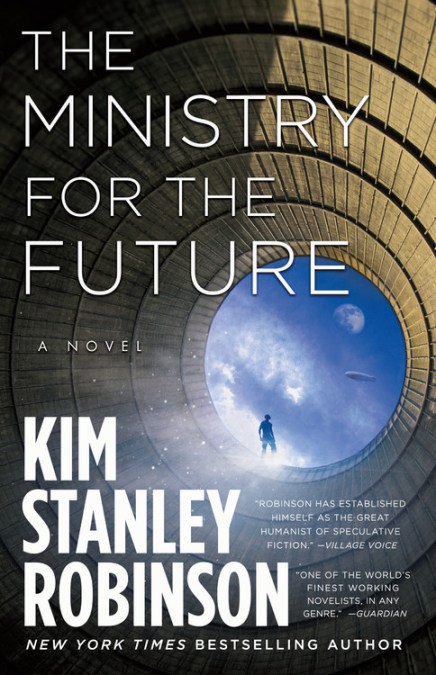 Kim Stanley Robinson is an optimist.
Kim Stanley Robinson is an optimist.
If you only read chapter 1 of The Ministry for the Future, you might not believe that. But even though his novel opens with a horrific and all too realistic disaster caused by climate change — and later describes several others — he isn’t writing a dystopia.
Rather he’s writing a story in which human beings find ways to deal with climate change without pretending that the process won’t be messy.
I called him an optimist, not Pollyanna. (Do people still read Pollyanna?)
He knows how bad things are and how much worse they can get, but he also knows we are capable of making things better. In this book, the efforts to address climate change include everything from economics to politics to geoengineering to violent actions against those who refuse to take action to stop carbon accumulation in the atmosphere.
There’s also what happens with climate refugees, mental breakdowns among those who have suffered from disasters, and violence against those working for real change. It’s a long book.
I have no doubt that we’re going to see something similar to the disorder he chronicles here over the next 30 years or so. I hope he’s right that we’ll get some of the positive changes, too.
He has more faith in political change than I have, but Wikipedia reports that Francis Fukuyama, who was notoriously wrong about the end of history, has called the book “ludicrously unrealistic.”
If I have to choose between Stan Robinson and Francis Fukuyama, I’m going with Stan every time.
If you’re looking for an overview of what we’re dealing with when it comes to climate change, this novel has it all. Stan has done the research and incorporated it into a story, so you’re going to understand the gist of what is happening and what needs to happen.
You could, in fact, use this book as a jumping off point for finding work you want to do or projects you want to support or political activity you want to engage in. If not everything that’s in the book is actually happening — or at least, not happening yet — something similar is going on all around you. It’s that much on point without being tied into the weeds of right now.
If you’re a writer or a literary scholar, you’re also going to be fascinated by the way Stan has put this book together.
For example, he plays a lot with point of view:
- Chapter 1 is told in the third person and past tense from the point of view of Frank May, who is experiencing the horrific disaster that starts the book.
- Chapter 2 is in the first person singular and present tense and is not told by a human or animal.
- Chapter 3 is back to third person, past tense, but reads like a news report.
- Chapter 4 is the first appearance of Mary Murphy, the head of the Ministry for the Future, and is told mostly in her point of view. She will appear a lot in the book.
- Chapter 5 is in the first person plural.
I could go on, but you get the idea. There are 106 chapters and he jumps around all the way through. He is telling the story of a lot of different people from a lot of different perspectives, and he is changing the way he tells it chapter by chapter. It’s an effective tool, though it does distance the reader from the characters.
I think that distance is on purpose and that it works, because this book is not one person’s story and it certainly isn’t a superhero story. Mary Murphy makes a lot of things happen — she pushes someone or gives someone the room to act or closes her eyes to something or listens to someone others might dismiss — but she is far from the only person responsible for the positive changes.
This book is about a future that many of us — even those who are getting up in years — are going to see. There are horrors in it, but there are joys, too.
My sweetheart is looking forward to the airships and I’d like to sail across the ocean on a modern sailing ship. And you know, it’s just possible that we might get to do those things.
But we’re going to get the bad parts, too.
